- Home
- Tim Winton
The Riders Page 7
The Riders Read online
Page 7
By the door he slipped on his greatcoat, walked into his gum-boots and pulled a scarf about himself. The hard, icy air hit him flat in the face as he stepped outside into the night. The luminous dial on his watch said three in the morning.
Scully went cautiously down the field in the darkness. There was no wind, only a sharp mist rising from the ground. Down there through the trees – no, beyond the trees, right down in the valley – lights were moving. As he climbed the stile at the edge of his field, Scully saw how the lights snaked; they were a procession. He cocked his head for the sounds of revelry, but heard nothing except the sound of Jimmy Brereton’s cows.
Scully crossed the road and climbed through the wall where the ash wood met the road. He picked his way over fallen branches, crunching through the frosty detritus with his own breath like a beacon before him. The great shadow of the castle reached out beyond the trees, silent, blank, still. With frozen grass snapping at his bare shins, he crossed the courtyard beside the ruins of the pumphouse, now just dark, reeling blocks at the corner of his vision, and came to the brow of the decline to see the romping melée of burning torches turn in across the fields and come circling beneath the bare oak beneath the castle steps. Torches. Yes, they were flames he saw travelling high off the ground. Now Scully heard the thud of feet, and as the lights passed beneath the old tree, he saw the glistening, steaming bodies of horses, he saw the bearded faces of men. Staffs. A lank standard. The breaking mud rose before them like a bow wave.
Ripping through blackberry and nettle, Scully bolted for the cover of a crumbling wall. The cold had reached his balls now, they felt brittle as Christmas baubles between his thighs. He pulled the coat harder about himself and peered through a gap in the stones. Down there, in the gently sloping field beneath the castle steps, the horsemen had assembled. There were about twenty of them in fancy dress. They were wildhaired, cloaked and highbooted. Two of them wore spattered grey chestplates and rags across their brows. Scully heard the horses snorting and heaving for wind. They shot out columns of steam and rattled metallic shudders. With firelight in the dark balls of their eyes, the riders looked up at the keep, and Scully tried to think, to find his way ahead of all this. He shook with cold. Out in the valley there were no more lights, no floods burning in the yards of local farms, no handy sign of life. He watched and waited, mesmerized. He saw weapons now, scars and blood, the restless twitching of reins. He saw the sheen of sweat along the horses’ flanks and the united gaze of the horsemen. They looked a mercenary lot, fierce and stoic. In all his life he’d never seen men like these. From where he crouched he couldn’t quite see the front of the castle keep, whether or not a light showed, if a door was ajar, or if someone was up there.
Around the ruined yard wall he crawled on his hands and knees till he could clamber across a mossy pile of rubble and make the cover of the blackthorn hedge hard up against the forecourt itself, but halfway to the hedge Scully put a foot down a hole and staggered and lost his balance completely. He tumbled and crashed and cursed down the slope, and when he came to a halt, smarting with pain and fright, he was out in the open, plain as midday. There was no use running. He figured it was just as well to stand and show himself in the weird light of the sputtering torches. He pulled himself upright, feeling the soft mud shift beneath the broken surface, but the riders sat unmoved from their fixed stations of expectation. Each of them was saddled, tense, eyes upcast to the keep where no light shone and no figure moved. Almost out of politeness he cleared his throat and kicked a couple of stones together to get their attention, but it felt as though he didn’t exist.
With arms held high, he stumbled down onto the muddy grass into the strong smell of horses. Closer there was a sourer scent, the stink of unwashed men. At the sudden splash of piss from a horse in the rear, Scully grunted in fright but not a man stirred. Their torches crackled, flames rigid in the still air, giving off the reek of pitch. With his pulse like an animal trapped beneath his skin, Scully moved between the riders, all but touching the heaving, rancid flanks of their mounts. Some of the horses had black, congealed wounds on their chests, and they looked as tired and cold and dazed as their riders. Some were boys, their scrawny legs bare and stippled with gooseflesh. And how they craned their necks, these riders. It was as though any moment some great and terrible event would explode upon them, as if something, someone up there could set them in motion. The sky was a comfortless blanket on them. The ground was mired and trodden. Shit stood in vaporous cakes between hoofs. The castle keep rose as a cudgel before them. He felt himself craning, waiting, almost failing to breathe. A horse shook its mane and Scully felt the mist of sweat against his cheek. His feet took root in the ground as they continued to wait and he waited with them. It was true, he knew it, something was about to happen.
But the awful stillness went on.
‘Is anybody there?’ Scully cried out toward the keep, his voice breaking with the strain of it. He was gasping with cold now and feeling the earth suck at him, drawing him into the fecund mire. ‘Is anyone here, then? Anyone at all?’
No head turned. Nothing stirred in the yawning dark of the keep and its broken wings. The ivy feeding off the ancient stones glittered with firelight. The crooked hewn steps of the castle approach stood bare of everything except rabbit pellets but the riders waited on undeterred. Scully’s skin hurt now. His eyes felt blistered. The air in his lungs scorched him and the buttons of his greatcoat burned all down his body. His legs stiffened and he was suddenly afraid of being swallowed up by the earth. It would kill him to stay any longer, but he stood transfixed, unable to imagine a cold worse than this, unable to convince himself to move. You’ll die, he told himself, you’ll die if you don’t go. He
heard his heart creaking in his chest. Like a man outside himself he saw his body move. He was a man trying to fly and the earth and the cold tore like a curtain as he pulled the coat about himself and ran.
• • •
AT THE TOP OF THE hill, quaking at his own door and sobbing with cold and fright, he turned again and saw the lights that burned patient as nature itself, burning as stars through the trees.
Twelve
ALL DOWN THE LONG, stinky tube of the jumbo jet, the lights come on and people stretch like cats. Billie looks up from her comic book about the poor, ugly hunchback to see her mother yawn and uncoil on the seat beside her. Her hair is black. It shines like a crow’s wing, like something that can fly at a moment’s notice. She looks over at the picture of the bellringer and wrinkles her little nose at Billie.
‘That old thing.’
Billie shrugs. It’s still her favourite, even though the pages are ratty. Used to be Scully’s when he was a boy. She has all his old comics and his Biggies books (which are plain stupid, really) and The Magic Pudding. In a tea-chest somewhere now, she has a whole snake-skin, a stick for finding water, and an old bag with books and papers in it. It’s hard to think of your father as a kid. Milking cows. With no TV. Before space rockets, even. Living like Tom Sawyer, that’s how Billie thinks of it. She feels sorry for kids with ordinary fathers. They only made one Scully. He isn’t handsome, but he’s special. He taught her how to swim and ride a bike. Before school he taught her how to read and write. Billie doesn’t forget things like that. He knows things and he doesn’t have secrets. What you see is what you get, like he says.
Once, in Paris, a lady fell down in the street right next to them and started wriggling all over the cobbles. It was a fit. She went bubbly at the mouth and the whole works. Everyone started steering away, saying ‘Oh-la-la!’ But Scully made Billie stand there while he got down next to the lady and stuck his newspaper between her teeth to stop her from biting her tongue off. The lady bucked and jumped but he talked to her the way she imagined he talked to cows when he was a boy. Probably, like a cow, she couldn’t understand a word anyway because he talked in English, soft and friendly, while all the people around them gasped. He brushed her hair with his hand and Billie wanted to sick up
right there. But she was glad he made her stay. He was crying, she saw him cry while the French lady bit on his newspaper and jiggled on the road. She knew it then, that they only made one Scully.
She jiggles her legs, careful not to kick the seat in front and get the old bloke with the hair growing out his ears all mad again.
Her mum grabs her handbag and slips on her shoes. Pretty feet with red nails. Pretty feet.
‘Just going to have a wash,’ she murmurs.
‘Okay,’ says Billie.
Billie goes back to her story. She likes the hunchback. He’s ugly and sad but his heart is good. He sees a long way out across the city. Paris. She lived there once and knows there should be an Eiffel Tower somewhere in this book, something the guy drawing the pictures forgot. Old Quasimodo can see forever. He’s got the free birds up there and the sky and the music of the bells that wrecked his ears, he loves them so much. Up there on big, scary Notre Dame with the statues stuck into doorways and the pigeons and donkeys out the front. When she closes her eyes she can see the bellringer darting around up there – she doesn’t need the comic anymore to do that. His hump weighing him down, bending him over like Jesus under the dragging cross. No one loves him, specially not the beautiful gypsy girl. She just sees his poor face and his hump. No one loves him the way Billie does because she knows there’s good in his heart.
People in the plane pull up the dinky little window sliders to let in some light. The plane is so high up it’s nearly in space. That nervous feeling comes back. She’s going to live in a little stone house with square windows and a chimney. Her dad will be there. She shouldn’t be afraid. But it’s hard to stay calm when you’re nearly in space, when you don’t know what’s coming.
Thirteen
SCULLY WOKE TO THE HARANGUE of a fresh norther in the slates, and at the thought of the cold outside the eiderdown his body stiffened. His face felt tender and his throat itched with the promise of a headcold. His hands tingled with nettle stings and one of his knees throbbed. He closed his eyes again in the still dim house on a hill in a strange country, and then with a slow burning in his limbs, he softened. This was it. Today was the day. He scrabbled at his watch. Man, he was late; it was after eight already and the flight got into Shannon at ten.
He whipped back the eiderdown and roared with the shock of the cold, and it was while he was wrestling with his jeans that he saw the mud on his legs. It was caked between his fingers, too, and there in the sheets. He remembered the cold and the riders distantly, as though recalling a dream. This afternoon he’d go down and have a look around, just to satisfy himself. Maybe talk to Brereton. But now he was late. Now the sun was up.
He stripped the linen and took it downstairs where the hearth drew breath and the windowpanes chattered. He should have been up two hours ago. With this day hanging before him so long, how could he have slept in?
In water cold and hard as brass, he washed himself standing in a tin tub. He shaved badly and ran upstairs with clean sheets. Then he found his Levi’s, his boots and pullover and pulled himself into shape.
Eight thirty-five. Now he was frantic, frantic enough to heave the tub of grey water against the closed kitchen window which sent it right back at him. He sat down, soaked and sober, moaning in frustration. He looked around, saw the dishes in the sink, the dirty sheets and mud-scuffs, the pool at his feet. He’d worked his guts out to get the place near perfect and now it looked like a student dive. Still, they’d see the change, they’d know how his heart had gone into it. He got up, lit the fire, stacked it with coal, and went out into the wind in his wet clothes.
• • •
ON THE TWISTING HEDGE ROAD into Roscrea, Scully drove hard and close, sending up curtains of mud everywhere he passed, with the walls and blackthorn against the streaming windows. Rain smeared his glimpses of fields and open places. There was no sky.
The town was jammed with cars parked wildly for Mass, and bells rang along the close grey rows of houses and shops. Out on the open road, Scully pushed the Transit to the limit, jiggling now, sweating with anticipation. The hills spewed cloud and water and the Tipperary fields opened up to the rain, sprouting here and there the ruined backbone of a tower, a gatehouse, a manor of old. He saw cottages collapsing under the weight of thatch wild with grass. All down the highway, across the country, there were solitary chimneys, great lonely walls, fallen churches with lichened crosses tilted like levers in the earth. Much rarer was the sight of a stand of timber, a wood, a forest remnant before more chocolate soil and squat, stucco farmhouses with grey gravel forecourts and Spanish arches. Every town said Failte, Welcome to Moneygall, Toomyvara, Nenagh, and each was jammed with the cars of Mass and the umbrellas of the walking faithful and the toll of bells, while the roads were quiet and blessedly free of trucks. Three cheers for a God-fearing nation, Scully thought, and for truckers on bended knee.
In the slate sprawl of Limerick he caught the time in a chipper’s window as 9.55. He crossed the bridge and saw the choppy surge of the Shannon beating seaward, and somehow his tension broke for a moment into wellbeing: he’d make it now, he’d be there soon.
The rain backed off. The road was clear.
• • •
ON THE LONG, flat dismal approach to the airport, Scully was grinning so hugely that other drivers veered away and kept their distance. A Pan-Am jumbo heaved itself into the air and passed over with its shadow trailing like a dragged anchor. Bon voyage, he thought; enjoy New York, have a happy life, all you people. The world is good and the aeroplane a gift of evolution.
• • •
INSIDE THE TERMINAL BUILDING the air was thick with cigarette smoke, the smell of wet serge and the shouts of people leaving and meeting. Here and there were the checkerboard slacks of Americans making their way to the Avis counter and the Dan Dooley Rent A Car. There were Irishmen in terrible jackets and thick-soled boots heading upstairs for a pint, and women with briefcases awaiting the shuttle back to London.
Scully sat a moment beside a coin-operated fire engine and saw a man cross himself – spectacles, testicles, wallet and keys – on his way up the escalator to Departures. Go well, old fella, he thought.
The flickering monitor said the Aer Lingus flight from London would land in a minute or two. What timing! They’d be tired after the twenty Qantas hours from Perth and the wait at Heathrow. He’d cook them lunch, stoke the fire and put them to bed with the wind rattling outside. Hell, he’d climb in with them, sleep or no sleep. He wondered if he could find a decent bottle of wine somewhere in this country before dark. Not on a Sunday. Now he needed a leak. He was like a kid, jiggling and fidgeting.
Down the hall he found the Men’s. At the mirror he stared at himself a moment. His curls were ragged and upstanding, and his dodgy eye and flushed complexion gave him a desperate look. He was lucky the Gardai at the terminal entrance hadn’t pulled him aside to search him for a Semtex suppository. He grinned slackly, straightened himself up best he could, pushed his hair down with the sweat of his palms and went out to meet them.
The monitor flashed LANDED. A wall of people curved around the electric doors of the customs exit. Scully wormed his way in and with a bit of foul play he found himself at the front rail itself.
The briefcase jobs appeared first, snapping their trenchcoats about them, hardly looking up at the press of other people’s relatives at the chrome barrier. Then came the trolleys with their teetering stacks of suitcases pushed by the bleary and the weeping. Shouts of recognition commenced. Families grappled and sobbed at the rail. Babies were passed head-high to the front. Scully could barely stand the guffaws and shrieks of other people’s happiness. He was crushed sideways and shunted from behind and he began hopping from foot to foot, straining to catch some familiar feature in the oncoming stream of faces.
And then, waist high, he saw the blonde curls.
‘Billie!’
She disappeared behind someone else’s trolley.
‘Billeee!’
&nbs
p; When she emerged he saw the small tartan suitcase in her hand, the fluorescent green backpack on her shoulders and the female flight attendant beside her. Billie’s eyes found him and blinked recognition. The poor kid looked pale and tired, completely wrung out. Scully looked for the trolley behind, that Jennifer must be pushing. He couldn’t imagine the excess baggage they must have forked out for. But the trolleys behind were all pushed by men. Scully saw the green sticker on Billie’s jacket. Saw her small hand holding the hand of the woman in uniform. Saw the clipboard and the brittle, cosmetic smile. He leapt the rail.
‘Billie, you should have waited for Mum.’
He grabbed her up, case and all, and felt her clinch him like a boxer. My God, but it felt good. She smelled of raspberry and of Jennifer. Through the haze of Billie’s hair he saw the trolleys coming on in small batches, then petering out altogether.
‘Mr Scully?’
He turned. The Aer Lingus woman smiled.
‘I’m afraid we need some identification, sir. The regulations, you know. She’s such a quiet girl.’
‘I’m sorry, I don’t think I . . . she’s got her passport, hasn’t she?’
‘Oh, yes, I have it here.’
Billie pressed into his neck so that he felt his blood beating against her forehead.
‘Well, what identification? Have they lost the bags?’
‘No, sir, this is all there was.’
‘It’s okay, we’ll wait,’ he said, smelling Billie’s hair; he was delirious.

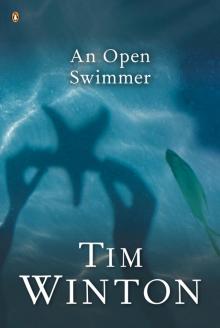 An Open Swimmer
An Open Swimmer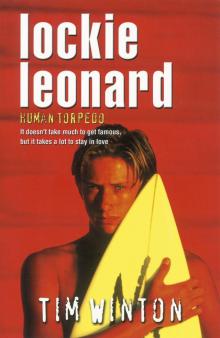 Human Torpedo
Human Torpedo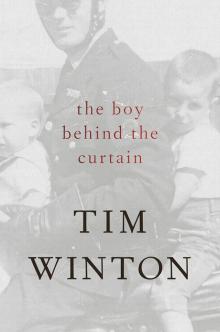 The Boy Behind the Curtain
The Boy Behind the Curtain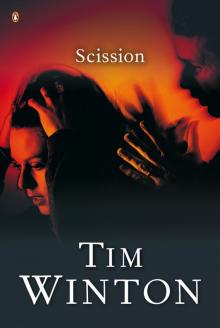 Scission
Scission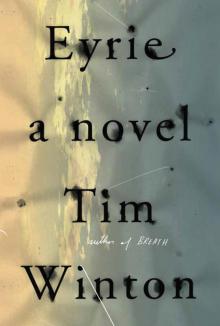 Eyrie
Eyrie Island Home
Island Home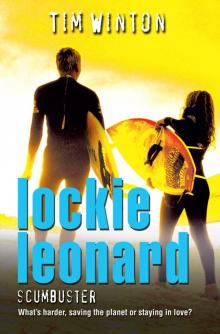 Scumbuster
Scumbuster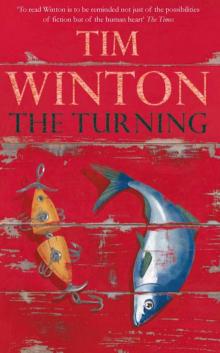 The Turning
The Turning Legend
Legend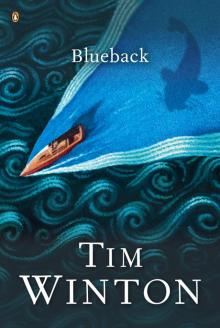 Blueback
Blueback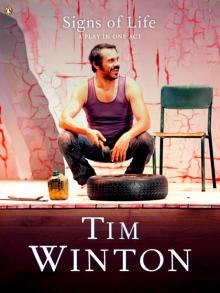 Signs of Life
Signs of Life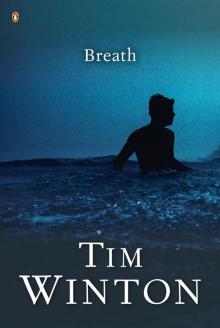 Breath
Breath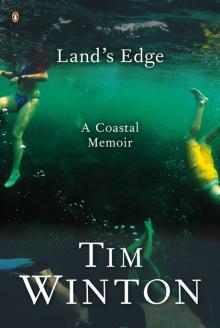 Land's Edge
Land's Edge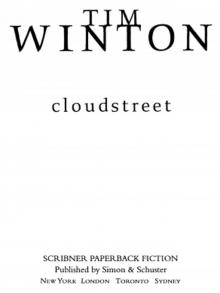 Cloudstreet
Cloudstreet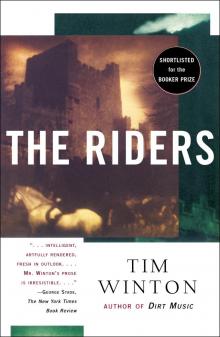 The Riders
The Riders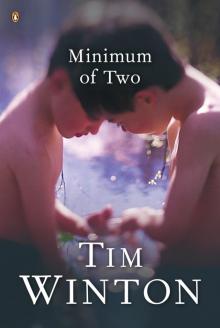 Minimum of Two
Minimum of Two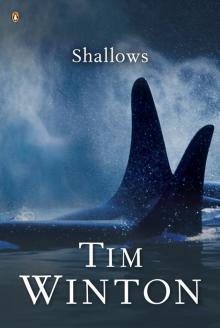 Shallows
Shallows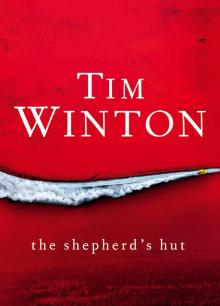 The Shepherd's Hut
The Shepherd's Hut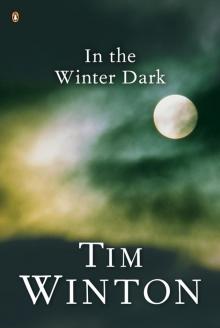 In the Winter Dark
In the Winter Dark